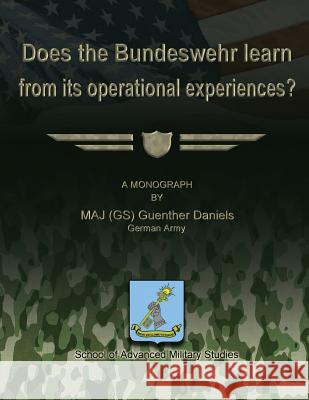Does the Bundeswehr Learn From its Operational Experiences? » książka
Does the Bundeswehr Learn From its Operational Experiences?
ISBN-13: 9781479286751 / Angielski / Miękka / 2012 / 48 str.
The way the Bundeswehr as an organization collects, analyzes and disseminates lessons learned from its operational experiences is not only of utmost significance for force protection and effectiveness in missions but also gives critical indications for how effectively the German Army learns as part of the Bundeswehr. This monograph analyzes the German lessons learned process on the basis of the two most relevant directives of the German Ministry of Defense and Standing Operating Procedures of the Bundeswehr Operations Command. These papers describe in detail purpose, responsibilities, coordination measures, workflow and organizational structure. The research here does not address the issue whether human behavior and leadership culture in the Bundeswehr contribute to its learning capability. That research does not lie within the scope of this study. The monograph introduces current approaches to organizational learning and identifies ten normative facilitating factors that promote learning. The more each facilitating factor is prevalent in an organizational unit the more opportunity exists for learning. The main discussion focuses on relevant elements that process lessons learned in the Bundeswehr in general and the Army in particular. The elements can be categorized in three groups: elements that acquire information, elements that interpret and disseminate information, and elements that ensure the application of lessons learned. These three categories and their interaction with each other are assessed by means of the identified facilitating factors. It appears that the German way to acquire, interpret, disseminate and ensure the application of lessons learned fulfills by and large the requirements of the identified facilitating factors. Accordingly, the lessons learned system is appropriate to provide the necessary and sufficient conditions that allow learning to emerge and flourish. However, the research also reveals barriers to learning that hamper effective organizational learning. The authority to release new knowledge and make it available as a lesson learned lies solely with the executive staff of the German Army. The lengthy process and the complicated lessons learned organizational structure hamper rapid collection and dissemination. Two cost-effective measures might mitigate the effects of these learning barriers. An independent lessons learned center posted on a case by case basis during major operations would help to facilitate rapid collection and dissemination of lessons learned in theater and the utilization of Web 2.0 technologies would virtually flatten the lessons learned organizational relationships and speed up the learning cycle.
Zawartość książki może nie spełniać oczekiwań – reklamacje nie obejmują treści, która mogła nie być redakcyjnie ani merytorycznie opracowana.











